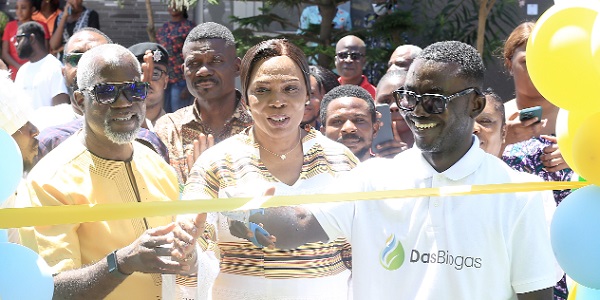
AMA, DasBiogas commission plant to tackle waste
A Biogas plant, which will process organic waste into energy, has been commissioned at the Accra Metropolitan Assembly (AMA).
The commissioning of the Biogas plant is part of a collaboration between DasBiogas and AMA, aimed at delivering a sustainable, cost-effective and environmentally friendly solution for managing Accra's increasing solid waste problem, specifically by transforming organic waste into valuable resources like cooking gas and fertiliser.
Commissioning the facility, the Deputy Director of Petroleum Downstream at the Ministry of Energy, Ali Nuhu Abeka, noted that the ministry’s renewable energy strategy sought to ensure that renewable sources such as solar, wind, and biomass made up at least 10 per cent of total energy consumption by 2030.
Speaking on behalf of the Minister for Energy, Mr Abeka said: "This innovation aligns perfectly with the ministry's strategy to promote waste to energy technologies, recognising the potential of biogas systems to power agricultural activities, which would reduce fossil fuel dependency and support economic growth,” he stated.
He highlighted that the launch of DasBiogas marked a significant milestone in achieving these renewable energy targets.
Waste to energy
Mr Abeka further emphasised the sustainability and environmental benefits of the biogas system, which tackled waste management, energy security and environmental sustainability, all at once.
He observed that such biogas systems could offer "practical and scalable solutions that can be replicated across the nation" to benefit communities, businesses and households.
He, therefore, urged all stakeholders to embrace this innovation and lead by example in adopting clean energy technologies, stating, "together, we can power businesses, homes and communities through organic waste to energy systems, ensuring that Ghana remains a leader in sustainable development across Africa".
Waste management
The Mayor of Accra, Elizabeth Tawiah Sackey, stated that the city generated over 1,200 metric tonnes of waste daily, a challenge that the local authorities were actively addressing.
She explained that the biogas plant was in line with AMA’s climate action plan, particularly its emphasis on segregating dry and wet waste.
She underscored the assembly's commitment to moving away from traditional waste disposal methods, making the separation of solid waste mandatory for households, hotels and other businesses.
Access to energy
The Founder of DasBiogas, Enoch Kofi Boadu, stated that the innovative biogas technology addressed two critical issues facing the country; waste management and reliable access to energy.
"Our vision is to offer every household and business the opportunity to turn organic waste into clean, affordable energy. The biogas plant represents that vision, an adaptable, sustainable solution ready to drive cleaner cities and greener lifestyles,” he stated.
Mr Boadu emphasised that with the government’s support, appropriate policies and incentives, the technology could be expanded across Ghana, encouraging households to convert their organic waste into clean cooking gas.
“With the government’s support, policies and incentives, this technology can be scaled across Ghana, encouraging households to sort their organic waste and convert it into clean cooking gas,” he added.
